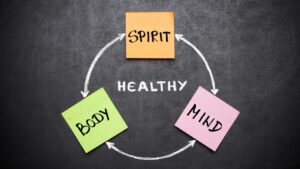In the bustling whirlwind of modern life, the concept of the body and mind’s interconnectedness often gets overlooked. Yet, it’s a subject that’s been at the heart of philosophical, scientific, and spiritual debates for centuries. This article will delve into the intricate relationship between the physical body and the intangible mind, exploring their definitions and the profound implications they have on our lives.
Unraveling the complex tapestry of the body-mind connection can lead to a deeper understanding of ourselves and our place in the world. It’s an exploration that can illuminate the path to better health, happiness, and personal growth. So, let’s embark on this intriguing journey together, shedding light on the fascinating interplay between our bodies and minds.
Define Body And Mind
Understanding the essence of the body and mind is fundamental to unraveling our identity and place in the cosmos. This section explores these core aspects of being, illuminating their definitions and interconnectedness as discussed in philosophical, scientific, and spiritual contexts.
The Physical Aspect: Defining the Body
 Human bodies, intricate biological machines, serve as physical vessels carrying us through life. They consist of fundamentally different components: bones provide structural support, muscles allow movement, organs perform specialized functions, and skin acts as a protective barrier. Realizing this harmonious operation of different parts can lead to a profound appreciation of the body’s complexity. At the molecular level, bodies consist of cells, the building blocks of life, structured in an almost unimaginable array of forms and functions. Whether we examine broad physiological systems or minute cellular structures, bodies showcase the remarkable unity and diversity inherent in life.
Human bodies, intricate biological machines, serve as physical vessels carrying us through life. They consist of fundamentally different components: bones provide structural support, muscles allow movement, organs perform specialized functions, and skin acts as a protective barrier. Realizing this harmonious operation of different parts can lead to a profound appreciation of the body’s complexity. At the molecular level, bodies consist of cells, the building blocks of life, structured in an almost unimaginable array of forms and functions. Whether we examine broad physiological systems or minute cellular structures, bodies showcase the remarkable unity and diversity inherent in life.
The Mental Aspect: Defining the Mind
 While bodies are physical entities, minds are phenomenological arenas, characterized by thoughts, emotions, memories, and consciousness. They are intangible, yet they profoundly influence how individuals perceive and interact with the world. The mind encompasses cognitive processes like learning, reasoning, and problem-solving, enabling the comprehension and manipulation of complex information. Besides cognition, the mind harbors our emotions: joy, anger, love, fear, and everything else we feel. These emotions influence our thoughts and actions, reaffirming the very real impact of the abstract mind on tangible life. Increasingly, scientific research supports that neurochemical processes form the basis of these mental phenomena, tying the mind and body together in a complex and dynamic relationship.
While bodies are physical entities, minds are phenomenological arenas, characterized by thoughts, emotions, memories, and consciousness. They are intangible, yet they profoundly influence how individuals perceive and interact with the world. The mind encompasses cognitive processes like learning, reasoning, and problem-solving, enabling the comprehension and manipulation of complex information. Besides cognition, the mind harbors our emotions: joy, anger, love, fear, and everything else we feel. These emotions influence our thoughts and actions, reaffirming the very real impact of the abstract mind on tangible life. Increasingly, scientific research supports that neurochemical processes form the basis of these mental phenomena, tying the mind and body together in a complex and dynamic relationship.
Understanding these aspects of body and mind opens the doors to enrich our lives, illuminating potential paths towards health, happiness, and growth. Through this comprehension, we are better equipped to manage our physical wellbeing, realize our emotional landscapes and nurture our cognitive abilities.
The Connection Between Body and Mind
Understanding the connection between body and mind becomes crucial when discussing human health and well-being. It’s a complex interplay between physical health and mental state, each influencing the other in a multitude of ways.
How Physical Health Impacts Mental Well-being
Physical health plays a vital role in mental well-being. Regular exercise, for instance, boosts serotonin levels, known for their mood-enhancing qualities. Published studies by Mayo Clinic reinforce these findings, highlighting the significant decrease in symptoms of depression and anxiety in individuals who engage in regular physical activity.
Moreover, experiencing physical health issues can unfortunately lead to a deteriorated mental state. As an example, chronic illnesses, such as heart disease or diabetes, often bring about feelings of despair or anxiety. Understanding the link between physical health and mental well-being, facilitates proactive measures in maintaining overall health.
How Mental State Influences Physical Health
 Equally important is the role of one’s mental state on physical health. Chronic stress, identified by medical researchers as a major mental health challenge, directly affects the body’s immune system. As confirmed in a study by The American Psychological Association, people under long-term stress were found to have a weakened immune response, leading to higher susceptibility to illnesses.
Equally important is the role of one’s mental state on physical health. Chronic stress, identified by medical researchers as a major mental health challenge, directly affects the body’s immune system. As confirmed in a study by The American Psychological Association, people under long-term stress were found to have a weakened immune response, leading to higher susceptibility to illnesses.
Similarly, pre-existing mental health conditions like depression and anxiety can exacerbate physical issues. To illustrate, individuals dealing with these conditions often experience difficulty sleeping, poor appetite, and general lethargy, all of which negatively impact physical health. Recognizing the weight of the mental state on physical health highlights the importance of a balanced body-mind relationship.

